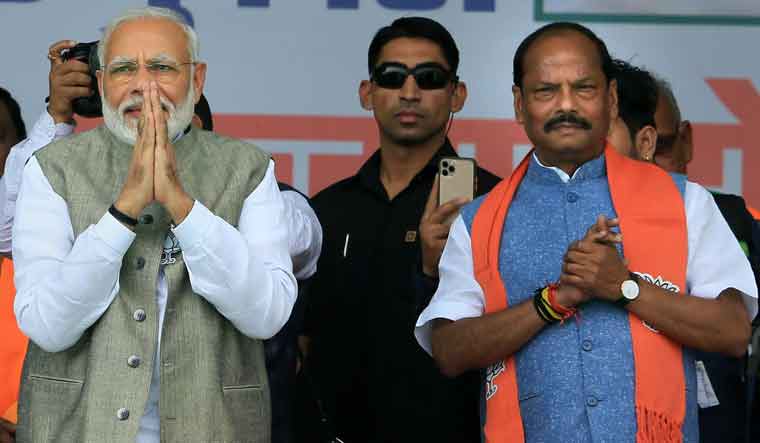Will the recent political developments in Maharashtra have a bearing on the upcoming Jharkhand assembly elections? As they head to the polling booths for the first phase of the five-stage assembly elections in Jharkhand on Saturday, voters are wary of a hung assembly in the state.
The aftermath of Maharashtra elections has caused much heartburn to the ruling BJP, while boosting the confidence of the opposition parties. In addition, the BJP faced a major setback as its sole ally, the All Jharkhand Students' Union (AJSU), broke the alliance.
The opposition parties, at the same time, have formed a grand alliance. Apart from AJSU, Babulal Marandi's Jharkhand Vikas Morcha is also contesting the elections without any allies this time. This is in addition to Asaduddin Owaisi's AIMIM fighting in 20 constituencies that have a significant number of Muslim population. Owaisi looks to capitalise on the indifference shown by mainstream political parties towards mob-lynch incidents in Jharkhand.

Anything can happen if the BJP or the grand alliance fails to get a majority to form a government in Jharkhand. Interestingly, the state has a history of even an independent MLA—Madhu Khoda—becoming the chief minister.
Tension has gripped both the camps as a result. Chief Minister Raghubar Das and the chief ministerial candidate of the grand alliance—JMM leader Hemant Soren—are both worried about the election outcome.
To add to Das's woes, influential leader Saryu Rai, a BJP rebel, is contesting against the CM from his sitting seat of Jamshedpur (East). Rai decided to contest against the chief minister after the BJP denied him a ticket in the election. The concern is evident from the fact that both Prime Minister Narendra Modi and UP chief Minister Yogi Adityanath have campaigned for the incumbent chief minister in Jamshedpur (East).
The article first appeared in Malayala Manorama
The grand alliance is calculating that the rebel candidate Rai will eat into the votes of Das. The opposition is fielding Congress candidate Gourav Vallabh against the chief minister.
Meanwhile, this time too, Hemant Soren is contesting from two seats—Dumka and Barhait. Last time he had lost at Dumka, but won from Barhait.
Ayodhya verdict
The BJP has raked up the Ayodhya verdict as an election issue in Jharkhand. The party's star campaigner, Yogi Adityanath, is projecting the Supreme Court verdict that allowed construction of Ram temple at the disputed site in Ayodhya as his party's victory. During his campaigns, the UP CM has been inviting people to visit Ayodhya to see the Ram temple. The party is also using 'Jai Sri Ram' chants to whip up the Hindutva sentiments. The Jharkhand assembly election will, inevitably, throw light on how far the BJP can gain from the Ram temple issue in light of the Supreme Court verdict.
Tribal factor
Winning the 28 tribal seats of the 81-member Jharkhand assembly is crucial this election. The stand taken by tribals, who constitute 27 per cent of the state's population, will influence the results. In the previous assembly elections, the JMM won 13 seats, while the BJP got 11. The opposition are banking on the fact that tribals are not happy with a non-tribal chief minister in power. The remarks made by CM Das at a recent event has aggravated the situation. Das had a slip of the tongue as he said the state would be made 'tribal-free', instead of 'plastic-free'. The opposition has pounced on this. The JMM campaigns in tribal areas calls for electing a tribal as the next chief minister.
Maoist stand
In a visible change of stance from the past, the Maoists, who consider the BJP and the RSS their chief opponents, have decided to support non-BJP parties in this election. Religious fascism and the crisis faced by the nation are the reasons stated by Maoists for their change of stand on boycott of elections.



